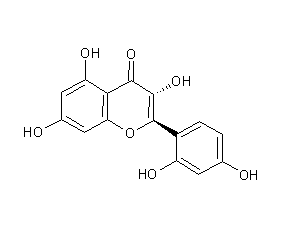
Structural formula
| Business number | 051U |
|---|---|
| Molecular formula | C15H12O7 |
| Molecular weight | 304.3 |
| label |
Taxifolin, taxane, Douglas firrin, (2R,3R)-Dihydroquercetin, (2R,3R)-3,3′,4′,5,7-Pentahydroxyflavanone, (2R,3R)-Dihydroquercetin |
Numbering system
CAS number:480-18-2
MDL number:MFCD00006845
EINECS number:207-543-4
RTECS number:None
BRN number:5299277
PubChem number:24887336
Physical property data
1. Character:Undetermined
2. Density (g/ m3,25/4℃): Undetermined
3. Relative vapor density (g/cm3,AIR=1): Not OK
4. Melting point (ºC):230-233
5. Boiling point (ºC,Normal pressure): Undetermined
6. Boiling point (ºC,5.2kPa): Undetermined
7. Refractive Index: Undetermined
8. Flash Point (ºC): Undetermined
9. Specific optical rotation (º): Undetermined
10. Autoignition point or ignition temperature (ºC): Undetermined
11. Vapor pressure (kPa,25ºC): Undetermined
12. Saturated vapor pressure (kPa,60ºC): Undetermined
13. Heat of combustion (KJ/mol): Undetermined
14. Critical temperature (ºC): Undetermined
15. Critical pressure (KPa): Undetermined
16. Oil and water (octanol / Log value of the partition coefficient (water): not determined
17. Explosion limit (%,V/V): Undetermined
18. Lower explosion limit (%,V/V): Undetermined
19. Solubility: Undetermined
Toxicological data
1 , acute toxicity: intraperitoneal administration in ratsLD50: 1200mg/kg, Biochemistry –Metabolism (intermediary) –Influence inflammation or mediate inflammation;
Mouse transperitoneallyLD50: 985mg/kg, no details except lethal dose;
2、Mutation data: Microbial organisms TEST Systemic mutations: Bacteria –Salmonella typhimurium: 100ug/Plate
Microbial organismTEST system mutation: bacteria– Salmonella typhimurium: 1660nmol/Plate
CytogeneticsanalysisTESTSystem: Rodents –Hamster fibroblasts:1 gm/L/ 48H
Ecological data
This substance may be harmful to the environment, and special attention should be paid to water bodies.
Molecular structure data
1、 Molar refractive index:73.31
2、 Molar Volume(m3/mol):167.9
3、 Isotonic specific volume (90.2K):549.9
4、 Surface tension(dyne/cm):114.8
5、 Polarizability(10-24 cm3):29.06
Compute chemical data
1. Hydrophobic parameters Calculate the reference value (XlogP):1.5
2. Hydrogen Bonding Number of donors: 5
3. Hydrogen Bonding Number of receptors: 7
4. Rotatable Number of chemical bonds: 1
5. Interchange Number of isomers:998
6. Topological molecules Polar surface area (TPSA):128
7. Heavy Atom Quantity: 22
8. Surface charge :0
9. Complexity :428
10. Isotope atomic number:0
11. Determine the number of atomic stereocenters:2
12. Uncertain number of atomic stereocenters:0
13. Determine the number of stereocenters of chemical bonds:0
14. Uncertain number of chemical bond stereocenters:0
15. Number of covalent bond units: 1
Properties and stability
Use and store according to specifications, no decomposition will occur, and avoid contact with oxides
Storage method
Save in a sealed manner and place it in a ventilated and dry place to avoid contact with other oxides.
Synthesis method
The plant source is Pinus pine[Pseudotsuga taxifolia Britt. (Douglas fir)], Hamamelidaceae plant mosquito Mother tree(Distylium racemosum Sieb.et Zucc .)etc.
Purpose
Anti-leukemiaP388Cellular effects and inhibition of Staphylococcus aureus , Escherichia coli, Shigella dysenteriae and Typhoid bacilli.

 微信扫一扫打赏
微信扫一扫打赏

